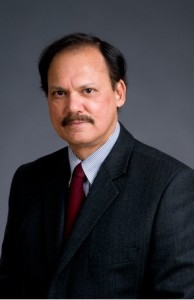We often forget that many of those who work within the Faculty of Medicine are also experts in the medical field. Dr. Amil Shah, whom most of us in the faculty know as Regional Associate Dean (VFMP), is also an oncologist (formerly practicing with the BC Cancer Agency). As part of our initiatives for Daffodil Month, we posed some questions to Dr. Shah about his choice in specialty and the progress of cancer treatment in British Columbia.
What drew you to the field of oncology?
I don’t think there was a single reason or event that led me to oncology. In my final year of medical school, I thought of pathology or internal medicine/cardiology as a career. I chose internal medicine and came to Vancouver from Montreal after my second year as a medical resident at McGill University, with the intention of returning there to pursue a fellowship in gastroenterology. While I was here, I met Dr. Ian Plenderleith, Head of Medical Oncology at the Cancer Control Agency of BC (now the BC Cancer Agency). I was impressed by his knowledge, humility, and compassion for his patients. He told me of the new medical oncology fellowship at CCABC, and he encouraged me to consider it. By then, I was drawn to the Vancouver lifestyle and took his advice; I have not regretted that decision.
What has been a defining moment in your career as an oncologist?
I am fortunate to have been part of a few important changes in cancer treatment in the province during my medical oncology career. One that I am particularly proud of is our rethinking of the treatment of rectal cancer in the early 2000s. As the Chair of the BCCA Provincial GI Tumour Group, I fostered the collaboration of the colorectal surgeons, gastroenterologists, radiation oncologists and others in promoting a new treatment protocol. The approach was not initially embraced by cancer centres in North America, but we were confident of success, based on analysis of patient outcomes in BC and the opportunity provided by the coordination of cancer care in the province through the BC Cancer Agency.
When it comes to cancer prevention, what are your top three pieces of advice?
The most obvious — and important — is not smoking. In addition to the well-known risk of lung cancer, cigarette smoking is linked to a number of other cancers, such as those of the oral cavity, larynx, esophagus, pancreas, bladder and kidney. A second advice is to follow the Canadian Cancer Society screening recommendations; the earlier a cancer is detected, the better the chance of a cure. Third, eat a good balanced diet, low in red meat but high in vegetables and fruits. In this regard, maintaining a normal body mass index is important, as obesity is associated with an increased risk for some cancers, such as those of the breast, uterus and colon.
What advice would you offer to patients who have recently been given a cancer diagnosis?
The diagnosis of a cancer can be devastating to patients and their families. I would encourage patients to learn more about their condition. Different types of cancer have different outcomes. Overall, 63% of Canadians diagnosed with cancer will survive at least 5 years after their diagnosis. To be sure, cancer remains a significant malady, but cure rates continue to increase slowly and steadily, and even when a cure is not possible, many patients are living for longer periods with a good quality of life. We are lucky in BC to have a provincial cancer organization, which ensures that all patients have access to a high standard of care irrespective of where they live in the province. Therefore, patients should feel confident that they are receiving good care no matter where they may live.
You’ve been an oncologist for 30 years. What has been the biggest advancement in cancer treatment over the course of your career?
Over the past two decades, there has been a remarkable advance in our understanding of what causes a cancer to develop. This is critical. One lesson we have learned in medicine is that you cannot truly turn a disease around until you understand its cause. We now have a deep understanding about what is at the root of the formation of a cancer. This knowledge comes from the discovery of key regulatory genes — oncogenes and tumour suppressor genes — that malfunction in cancers. This has led to the crafting of a brand new class of anti-cancer drugs, called molecularly targeted agents, that counter the action of the cancer genes. However, there is still much to be learned. It is important to note that the “cancer genes” are mutated versions of important normal genes that control important cellular functions, including cell growth and division. The interaction among the cell’s numerous genes is complex, and they form a network, so that interfering with one pathway affects others — sometimes unpredictably and adversely. Now that we have an increasing number of molecularly targeted anti-cancer agents, we have to understand the optimal way to use them. I believe that this will only come from unravelling the complex cellular gene network, and, in my opinion, this should be a priority in cancer research.
Being an oncologist must be challenging both professionally and emotionally. What motivates you?
There is no doubt that the practice of oncology brings its challenges, but so do other medical disciplines. I am always moved when I am greeted, sometimes years later, by former patients or their family members, who express their thanks. Also, witnessing and being a small part of the progress made in the treatment of cancer in the province is, indeed, rewarding.

